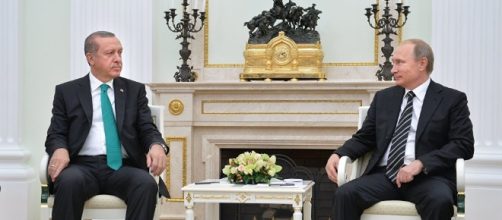The National Review has published a detailed analysis of relations between Turkey and Russia and predictions of the consequences of the new economic and political alliance.
Although independent observers have assessed that a recent Turkish referendum in which the president was given all executive powers was not conducted freely or fairly, Recep Tayyip Erdogan said that the debates had ended and he would not accept any changes to the results.
Erdogan has been promoting 'neo-Ottoman' values for years
After the referendum, he did not visit the tomb of the founder of the Republic Mustafa Kemal Ataturk, but Mehmet conqueror, and with that act, he symbolically turned his back on the Western idea of democracy.
This move crowned his ten-year promotion of "neo-Ottoman" values. This neo-Ottoman orientation was just the beginning of the departure of Turkey from the West. Even though they have been looking for EU membership recently, they seem ready for a full alliance with a seemingly unexpected ally, Russia.
NATO Secretary-General Jens Stoltenberg after visiting Ankara and Istanbul last year, complimented Turkey for "major contributions to the fight against terrorism," even though Erdogan actually transformed the state into an ISIS subway, supporting and supplying al-Qaida allies in Syria, Michael Rubin writes for The NationalReview. At first glance, the alliance between Turkey and Russia sounds illogical.
These two states are historical enemies. Russia fought against the Ottoman Empire, and during the Cold War, Turkey was one of two NATO members on the border with the Soviet Union.
In recent years, two states have been struggling with the situation in Syria. Russia has backed Assad's regime and Turkey backed the opposition. The peak of tension was a Russian military plane crashing into their airspace.
The Syrian opposition with the support of Turkey killed a pilot. The Russian government is backed by a ban on Russian tourism companies operating in Turkey. In recent months, Erdogan and Putin have reconciled and tourists have returned. The presidents met twice, in St. Petersburg and Istanbul, to resolve the problems. They talked about energy, infrastructure.
Even the murder of a Russian ambassador committed by a Turkish al-Qaeda-style police officer failed to prevent the two powerful presidents joining.
Turkey could be a 'Trojan horse' for NATO
The ironic fact is that while Erdogan is closer to Russia, the United States does not fear that Turkey could jilt NATO, but fear they will not leave it. Turkey could act like a Trojan horse and prevent the execution of NATO decisions that do not have a mechanism for ejecting allies out of the political and democratic norms of the alliance. The traps of the alliance are even greater, due to Turkey's ability to redeem the new generation of F-35 fighters, which the Pentagon calls the new generation of the air force.
Erdogan is a beginner compared to Putin
What Erdogan doesn't realize is how much of a risk is the game for the future of Turkey. While The United States looks at its leaguers as partners, Russia notices them as clients. Erdogan may think he can overtake Putin, but he is a beginner compared to a KGB-trained leader.

